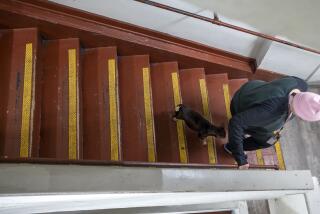Condo Boards May Be Liable in Crimes, Justices Rule
- Share via
SAN FRANCISCO — Nonprofit condominium associations and their directors may be held liable for failing to adequately protect condo owners from crime, the state Supreme Court ruled Thursday.
The justices, in a precedent-setting, 4-2 decision, said associations and individual members of their boards of directors owe the same “duty of care” the law already requires of landlords toward their tenants--and that they can be sued when they could reasonably have foreseen the potential for crime but failed to take steps to prevent it.
The court reinstated a negligence suit brought by a Los Angeles businesswoman against a Baldwin Hills condominium association for injuries she said she received in an attack by an intruder who raped and robbed her in her residence in October, 1980.
She charged that the directors wrongfully required her to remove the additional exterior lighting she had installed after a crime wave in the area of the 64-acre, 600-unit complex.
The court’s ruling, its first on the issue, is likely to have wide application. A rapidly growing number of Californians now live in condominiums, cooperatives and other types of “common-interest” housing projects. By recent estimates, there are about 15,000 such associations now operating in the state.
In dissent, Justice Stanley Mosk, joined by Justice Malcolm M. Lucas, warned that the court, by imposing a new duty on voluntary, nonprofit condominium associations, had exposed associations and their directors to “unwarranted and potentially substantial civil liability.”
The case arose when Frances Troy, then a resident of the Village Green Condominium Project, installed extra lighting outside her residence after a series of burglaries and robberies in the complex--including a burglary in her own unit.
However, she was told by the board that condominium association regulations barred such additions. According to Troy, she complied with the board’s order but when she cut off the power on the circuitry controlling all the exterior lighting, her unit was left in total darkness--and on that night she was raped and robbed.
A trial court dismissed the subsequent suit the woman brought against the association and its directors. But the justices Thursday reinstated the action, saying the woman should be given a chance to go to trial to try to prove that her injuries were attributable to the failure by the association and its directors to permit additional lighting or take other steps to prevent crime.
Justice Allen E. Broussard, joined by Chief Justice Rose Elizabeth Bird and Justices Cruz Reynoso and Joseph R. Grodin, rejected contentions by the association that it would be unfair to force it to provide expensive security measures from its limited budget without the majority-approval of its members, as required by association rules.
“The association is, for all practical purposes, the project’s ‘landlord,”’ Broussard wrote, and thus “has a duty to exercise due care for the residents’ safety” under its control.
If it was true that the association was aware of previous crimes in the area, it was “on notice” that additional lighting could deter future criminal acts, the court said.
Similarly, if the directors knew of the threat of crime and yet failed to act, they, too, could be liable for increasing the risk of injury to the condo owner, the justices said.
The court stressed, however, that the directors may have acted “quite reasonably” under the circumstances and that the link between the lack of lighting and the crime may be too remote. But those questions should be left to a jury, it said.
Justice Edward A. Panelli, the newest member of the court, did not participate in the case.
Terry Steinhart, the Los Angeles attorney who represented Troy in the case, praised the ruling.
“This says that homeowners’ associations and directors stand in essentially the same position as landlords in being responsible for taking reasonable security measures to protect residents from criminals,” he said.
However, Steven J. Revitz of Los Angeles, a lawyer for the association’s directors, warned that the decision would likely result in more such lawsuits and could make it more difficult for directors and associations to obtain liability insurance to protect them against such actions.
“It may also make directors, who serve without compensation, less willing to serve on such boards,” he said. “Who wants to serve if they can get sued when someone in the project gets attacked?”
More to Read
Sign up for Essential California
The most important California stories and recommendations in your inbox every morning.
You may occasionally receive promotional content from the Los Angeles Times.













